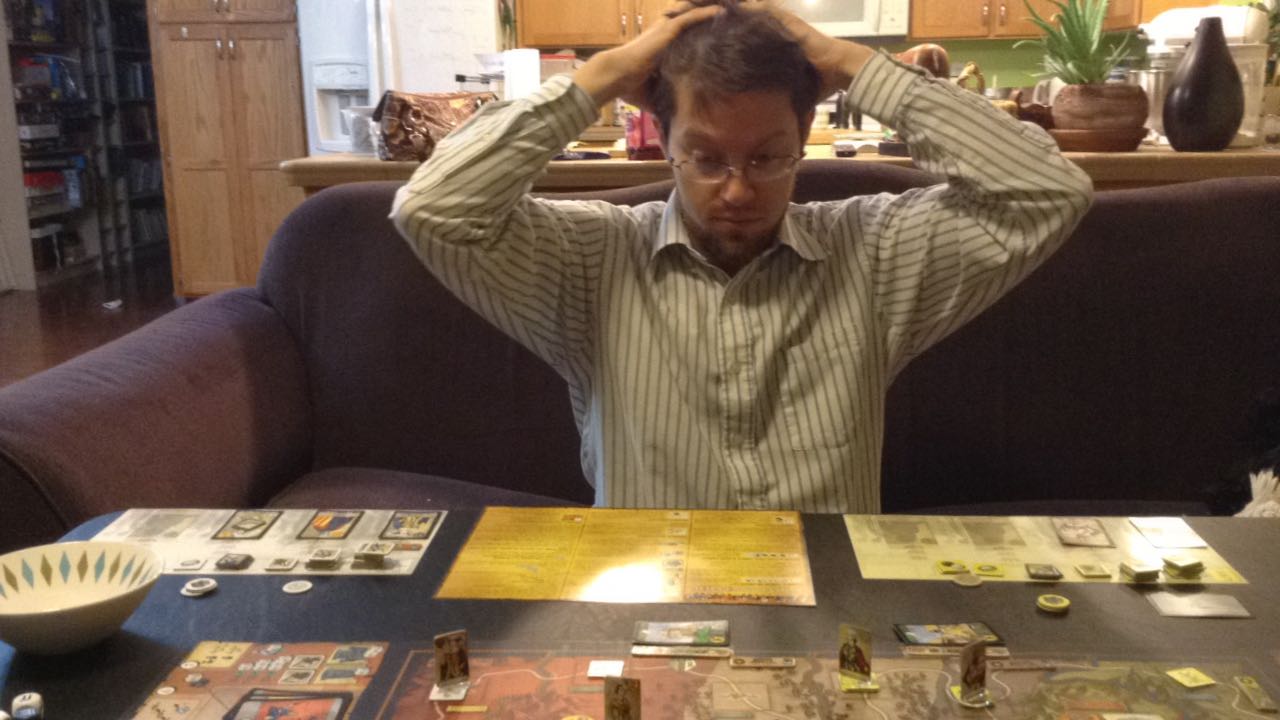Fief: France 1429 — the game I've been waiting for
 When I started playing board games, I sort of assumed I would be drawn into a world and get to play a character.
When I started playing board games, I sort of assumed I would be drawn into a world and get to play a character.
I'm not sure why I thought this. I've never played a role-playing game. I'd played Scotland Yard and my friend Will's super fun Mango Republic (no affiliate link here, just a plug for a good game). Then I learned Settlers of Catan (back before it became just Catan), then Carcassonne. I moved on from there, but none of those games really put me in a world.
Still, I had a sort of ideal in my head about what a game should be and do.
I didn't realize that until I played such a game. That game, my friends, is Fief: France 1429. It's hard to explain how I felt the first few turns of Fief. It was like the ideal gamer in me awakened and said, "Yes, this is it."
I don't know if you'll feel like that if you play it, but I hope you do.
You can read my full review of the game below. It was originally published on News for Shoppers. From here on, all the links are affiliate links. If you click and buy, I get a commission that helps me keep bringing you this kind of content. If you don't, I'll still keep bringing you this kind of content.
Fief: France 1429 is a game of battle, negotiation, conquest, alliances, and (perhaps) backstabbing.
The game, designed by Philippe Mouchebeuf and published by Academy Games and Asyncron, works for three to six players ages 14 and up and plays in two hours or more.
Its suggested price is $75, but can be preordered for about $50. It releases March 18. The expanded edition, which includes five expansions, is available now for $100. I'll be reviewing the expansions later.
How it works:
In Fief, players control up four lords and ladies in a noble family trying to gain three victory points by influencing France. They start by controlling villages, and branch out to fiefs and bishoprics. Points are earned by controlling a fief and being elected king or pope.
If there are at least four players, two families can form an alliance by marriage — which can only be dissolved by death or the pope's approval — but must have four points between them to win.
Players, even allies, can fight each other and hold each other's cities under siege.
Why you might play Fief: France 1429:
This is an incredibly well designed game. It's quite complex, but its 19-page rulebook is clear and well organized, and the two-sided player reference card will keep you straight about what to do when and how to run elections.
If you like negotiation in games, this one does it very well. You can negotiate for almost anything, but if you want to do it secretly or make certain kinds of exchanges, you'll have to give up one of your three precious diplomacy tokens to do so. Structuring the negotiation makes it feel less like a free for all, but it creates the unique situation where two players can leave the room for a private chat.
The game is beautiful. The components are lovely and there are a lot of them. Although I'm not usually a fan of characters in stands because they can feel too much like a kids' game, these stands work.
Even after several times playing, you will still be finding new strategies and ways to work with or against your opponents.
If you like playing with five or six players, this is an excellent choice. Fief plays best, I think, with more players.
Why you might not play Fief: France 1429:
The price is steep. That said, a lot comes in the box, and the game has tons of replay value. You won't get bored.
If you don't like long games, you should pass this one by. You only need three points, but they're not easy to get.
If you don't like to negotiate, you can probably get by playing it with three players, but with more than that, you'll be frustrated.
My conclusions:
This game is exactly what a board game should be.
You get to play characters, you're immersed in a world, you need lots of strategy and tactics to get what you need.
There are so many interesting decisions in this game, from backing out of a battle to voting for the king.
The alliances make the game seem like a team game, but because they can be broken, you can never trust an opponent. Your wife could assassinate you and steal victory for herself.
I am not a fan of negotiation in games because often someone will give a player what they need just to speed things up. But I love it in Fief because both players in the negotiation generally benefit, and it has some structure.
If this sounds intriguing to you, find a place to play it and decide for yourself. It's a big investment, but I think it's more than worth it.
Full disclosure: I received a review copy of Fief: France 1429 from Academy Games. I was not required to write a positive review. This is my honest opinion.
Here are a few other titles from Academy Games, as well as the other games I mentioned above.
